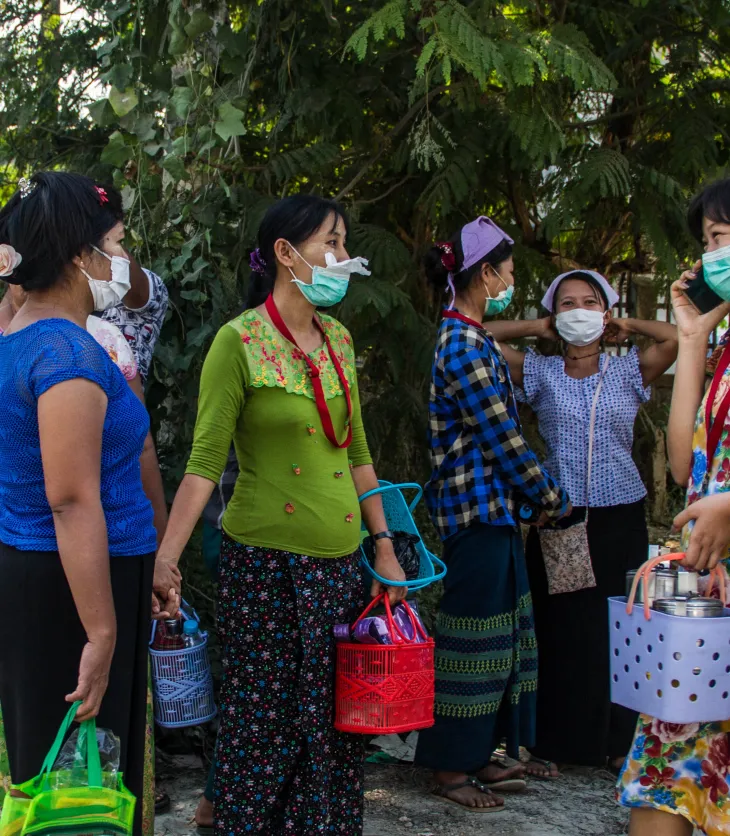Ye Yint Khant Maung discusses the hardships unionists face during the COVID-19 pandemic.

On International Workers’ Day, May 1, President U Win Myint offered a statement about the government’s commitment to tranquil workplaces, fair and proper dispute settlement processes, freedom for independent trade unions, and workers’ safety through tripartite efforts. However, the message had a caveat: “You [Workers] also need to be especially aware that outside instigators can incite unlawful demonstrations and unrest for personal or political gains.” Indeed, if the government is effectively protecting labor rights and is dedicated to tripartite efforts, then there seems no need or justification for protest. But the government’s rhetoric is a far cry from reality.
The government has, in fact, dismissed unionists’ suggestions, disregarded their formal disputes, and used COVID-19 to justify intimidation and arrests of protestors. Employers have ignored COVID-19 related concerns raised by unionists, exploited their inability to strike, and used the pandemic as an opportunity to sack unionists en masse. The government and employers have weaponized COVID-19 to union-bust so that unionists have had to scramble and employ different tactics to protect themselves and other workers.
Every four months a National Tripartite Dialogue Forum (NTDF) gathers government, employer and worker representatives. On 25 March 2020, the tripartite forum became a platform to discuss how to manage the potential risks and impact of COVID-19 on workers. In attendance was the Confederation of Trade Unions Myanmar (CTUM), the Myanmar Industries Craft and the Service-Trade Unions Federation (MICS) and the Agriculture and Farmer Federation of Myanmar (AFFM-TUF). These Federations collectively called for the temporary shutdown of factories, with paid leave in April covered in part by the government. They also called for immediate actions to prevent the targeted termination of unionists without due process. Their recommendations were dismissed entirely.
As the pandemic played out, federations (registered and unregistered) continued to raise concerns about the rights and safety of workers, particularly in relation to crowded workplaces and absent protective equipment. They continued to reiterate the importance of considering the well-being of workers, whether through workplace safety measures or protecting salaries in the case of dismissals or factory closures. Their message was that if workers and unions were protected, there would be no reason to strike.
A worker representative from the CTUM explained that when factories chose to reduce their workforce, employers did not negotiate with the trade union or the Working Condition Committee (WCC). According to the law, employees and employer representatives must form a WCC to solve factory level concerns. However, employers sacked workers as they pleased and targeted unionists. That way, when the factory reopens or increases their workforce, unionists are less likely to be working at the factory. The union then had no choice but to strike. This same scenario continues to play out because there is no formal procedure to manage the dismissal of workers when workforce reduction is necessary. Without governance over dismissal and paid leave, there is nothing to prevent union-busting.
Ye Yint Khant Maung is a researcher with Yangon-based think-tank Urbanize: Policy Institute for Urban and Regional Planning. He was a student of Yangon University of Economics and Yangon School of Political Science. The author wishes to thank Matthew Mullen for his comments and support in this writing.
Like This Article
June 18, 2024
December 28, 2023
November 22, 2023

Center for Southeast Asian Studies, Asian Institute 1 Devonshire Place Toronto, Ontario, M5S 3K7, Canada
©TeaCircle All Rights Reserved 2023